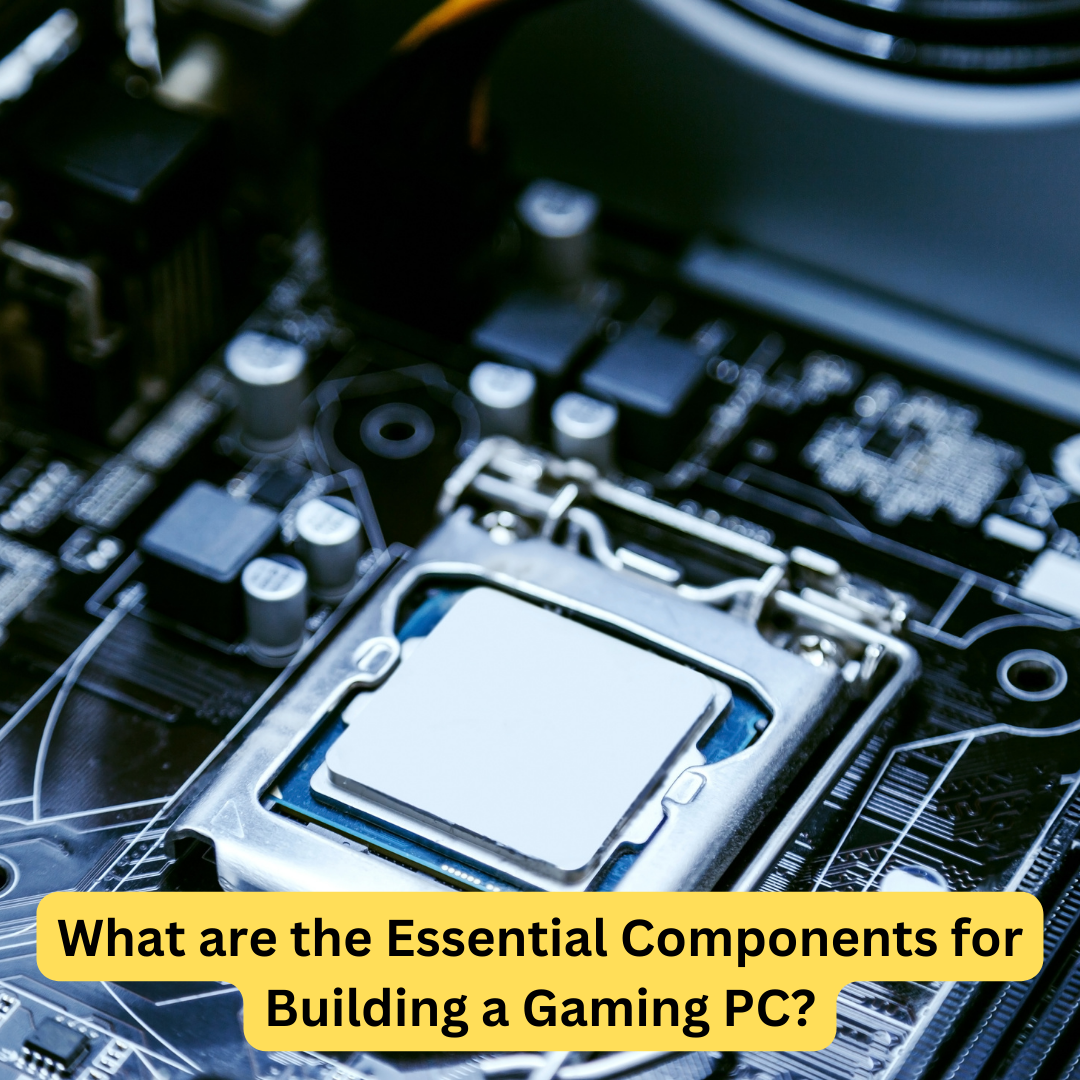What are the Essential Components for Building a Gaming PC?

In this article we are going to discuss What are the Essential Components for Building a Gaming PC? Building a gaming PC is a rewarding venture, providing a tailored experience that pre-built systems often lack. To construct a gaming PC, several key components are essential. These include the central processing unit (CPU), graphics processing unit (GPU), motherboard, memory (RAM), storage, power supply unit (PSU), cooling system, and the PC case.
What are the Essential Components for Building a Gaming PC?
Each part plays a crucial role in determining the system’s performance, reliability, and overall user experience.
1. Central Processing Unit (CPU)
The CPU is the brain of the computer, handling all the instructions from software and hardware. For gaming, a high-performance CPU is vital, as it influences the game’s frame rate and overall responsiveness. Popular choices include Intel’s Core i5 and i7 series, as well as AMD’s Ryzen 5 and Ryzen 7 series.These CPUs offer a good balance of price, performance, and energy efficiency. When selecting a CPU, it’s essential to consider the number of cores and threads. Games are increasingly optimized for multi-core processors, so opting for a CPU with at least four cores is recommended.
2. Graphics Processing Unit (GPU)
The GPU, or graphics card, is arguably the most critical component for a gaming PC. It renders images, animations, and videos for the monitor, significantly affecting the visual quality and frame rates of games. Leading GPUs from NVIDIA (such as the GeForce RTX series) and AMD (Radeon RX series) provide excellent performance. For most modern games, a mid to high-end GPU is necessary to run at high settings and resolutions. Features like ray tracing, which enhances visual realism, and DLSS (Deep Learning Super Sampling), which improves performance, are also worth considering.
Also Check: 10 Best Websites to buy Gaming PC
3. Motherboard
The motherboard serves as the main circuit board, connecting all the components of the PC.It determines the compatibility of the CPU, RAM, and various other peripherals. When choosing a motherboard, ensure it supports the chosen CPU socket and chipset. Common form factors include ATX, Micro-ATX, and Mini-ITX, with ATX being the most popular for gaming PCs due to its expandability. The motherboard should also offer multiple slots for RAM, adequate PCIe slots for the GPU and other expansion cards, and ample USB ports.
4. Memory (RAM)
RAM (Random Access Memory) is crucial for gaming because it stores data that the CPU needs to access quickly while running programs. For gaming, 16GB of DDR4 RAM is generally considered the sweet spot, offering a good balance between cost and performance. However, for more demanding tasks or future-proofing, opting for 32GB might be preferable. Additionally, RAM speed (measured in MHz) and latency are important, with higher speeds and lower latency providing better performance.
5. Storage
Storage impacts not only how much data you can save but also how quickly your system and games load. Solid State Drives (SSDs) are highly recommended over traditional Hard Disk Drives (HDDs) due to their faster read and write speeds. An NVMe SSD, which uses the PCIe interface, offers even higher speeds and is ideal for installing the operating system and games. A typical gaming PC setup might include a 500GB or 1TB NVMe SSD for the OS and frequently played games, coupled with a larger HDD (2TB or more) for additional storage.
Also Check: Top Websites in the World
6. Power Supply Unit (PSU)
The PSU supplies power to all the components in the PC.It’s essential to choose a reliable PSU with enough wattage to support all the components, especially the GPU and CPU, which consume the most power. A PSU with an 80 Plus certification ensures energy efficiency. Calculators available online can help determine the necessary wattage based on the chosen components. Additionally, opting for a modular or semi-modular PSU can help with cable management by allowing you to connect only the cables you need.
7. Cooling System
Effective cooling is critical to maintain the performance and longevity of your gaming PC. This can be achieved through air cooling, using fans and heatsinks, or liquid cooling, which is more efficient but also more expensive and complex to install. The CPU and GPU typically come with their own cooling solutions, but aftermarket coolers can offer better performance. Additionally, ensuring good airflow within the case is important, which means strategically placing case fans to expel hot air and draw in cool air.
8. PC Case
The case houses all the components and contributes to both aesthetics and functionality. It should be spacious enough to fit all components, including the GPU, which can be quite large, and allow for good airflow. Popular case sizes include full-tower, mid-tower, and mini-tower, with mid-tower being the most common for gaming PCs. Features like tool-less drive bays, cable management options, and dust filters can make building and maintaining the PC easier. Aesthetics, such as tempered glass panels and RGB lighting, also play a role in the selection process.
Conclusion
Building a gaming PC involves careful consideration of each component to ensure they work together seamlessly. The CPU and GPU are paramount for performance, while the motherboard ensures compatibility and connectivity. Adequate RAM and fast storage enhance the gaming experience, while a reliable PSU and effective cooling maintain stability. The PC case not only protects and cools the components but also contributes to the system’s aesthetics. By carefully selecting and assembling these components, you can build a gaming PC that offers a personalized and high-performance gaming experience. So now I hope you understand about What are the Essential Components for Building a Gaming PC.




